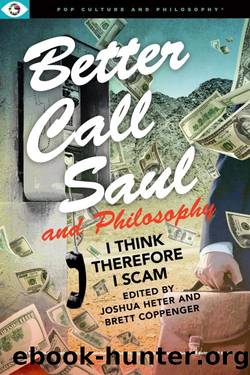Better Call Saul and Philosophy by Joshua Heter

Author:Joshua Heter [Joshua Heter]
Language: eng
Format: epub
Published: 2022-09-09T18:11:41+00:00
From Past to Future
Chuckâs behavior toward Jimmy is oriented toward the past; he wants Jimmy to be held accountable for his past wrongdoings. So, Chuck creates a Platonic cave of his own making that imprisons himself and Jimmy, all while severely compro mising his humanity because of an insidious use of his imagination that results in an attitude of meanness toward Jimmy and a sense of cowardice to be in a right relationship with him.
There is thus, on the one hand, Chuckâs bizarre commitment to his hypochondria, which is thoroughly irrational, and, on the other hand, Chuckâs commitment to rationality as a practicing lawyer that enables him both to be faithful to his clients and to accurately theorize, investigate, and accuse Jimmy in the Mesa Verde numerical transposition scandal. For Chuck, then, Jimmyâs pastâand his ownâare the impetus for the dysfunctional relationship between Chuck and Jimmy that shows itself on the screen.
What would it take for Chuck to see Jimmy differently? How could Chuckâs relationship with Jimmy be improved? We know that an overwhelming sense of past-oriented vengeance directs Chuck in his relationship with Jimmy. But what if Chuckâs orientation toward Jimmy was future-oriented instead of past-oriented? What if Chuck could step away from Jimmyâs past wrongs and his sense of vengeance long enough to accept Jimmy on his own terms rather than attempt to make Jimmy into who Chuck thinks Jimmy should be through his own sense of justice, imprisoning himself and Jimmy in a cave of his own making?
In his novella, Repetition, Kierkegaard, writing through a pseudonym named âConstantin Constantius,â tells the story of a young man in love who reaches out to Constantin for help because he is having difficulty in his relationship with a woman. The young man is in loveâhe is engaged to be married, but wants to break the engagement and does not know how to do it. Through a series of letters, the young man explains his predicament and would like some advice from Constantin on what to do. But Constantin, because he is an intellectual observer, cannot give any advice to the young man.
Constantinâs character represents a sort of stale intellectual figure who is so busy thinking about abstract concepts that he is unable to live in the concrete reality of the here and now. Heâs too much of a thinker and not much of a doer and thus cannot move forward himself, let alone advise the young man on how to move forward in his relationship with his fiancée. Constantin can only look backward; that is, he is preoccupied with his past, trying to recapture moments that he has enjoyed, such as his trip to Berlin.
No matter how hard Constantin tries to duplicate the experience from his trip to Berlin, he remains unsatisfied. Nothing is ever quite the same or as enjoyable as it was during his pre vious trip to Berlin. The young manâs request for help, then, is like asking the blind to lead the blind: the young man does not know what to do to move forward and neither does Constantin.
Download
This site does not store any files on its server. We only index and link to content provided by other sites. Please contact the content providers to delete copyright contents if any and email us, we'll remove relevant links or contents immediately.
Head of Drama by Sydney Newman(2025)
Robin by Dave Itzkoff(2010)
I'm Judging You by Luvvie Ajayi(1893)
The Paranormal 13 (13 free books featuring witches, vampires, werewolves, mermaids, psychics, Loki, time travel and more!) by unknow(1850)
Single State of Mind by Andi Dorfman(1515)
Ten by Gretchen McNeil(1501)
#MurderTrending by Gretchen McNeil(1397)
Key to the Sacred Pattern: The Untold Story of Rennes-le-Chateau by Henry Lincoln(1352)
Most Talkative by Andy Cohen(1311)
Merv by Merv Griffin(1268)
This Is Just My Face by Gabourey Sidibe(1181)
Notes from the Upside Down by Guy Adams(1180)
Jamie Oliver by Stafford Hildred(1148)
The Hunger Games: Official Illustrated Movie Companion by Egan Kate(1121)
Springfield Confidential by Mike Reiss(1107)
Clarkson--Look Who's Back by Gwen Russell(1079)
The TV Writer's Workbook: A Creative Approach To Television Scripts by Ellen Sandler(1072)
Blue Planet II by James Honeyborne & Mark Brownlow(1022)
Dark Angel by D. A. Stern(1015)
